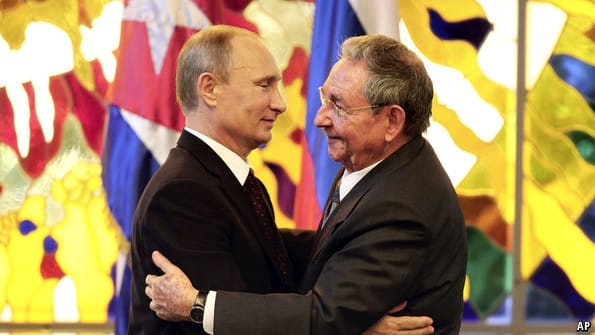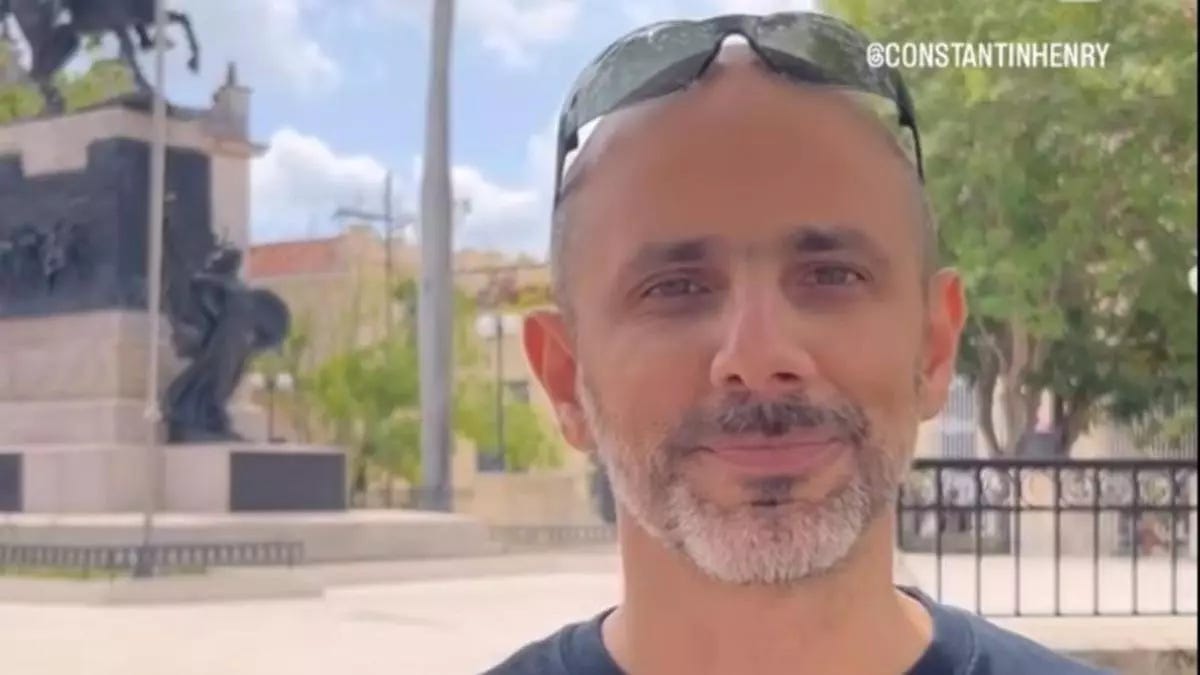11J changed Cuba and Cubans forever
The historic protests tore a hole in the fear-scape that had silenced Cubans for 66 years.

3-9 julio 2025
Hola y welcome back.
CubaCurious turns one on Friday, a toddler in some ways, but a determined one. 11 July 2024 was the third anniversary of the historic anti-regime uprising that swept the island in 2021. So I marked the anniversary by launching CubaCurious.
This Friday, the Cuban musicians who wrote “Patria y Vida” are marking the third anniversary of 11J by releasing their the documentary about the song, which became an instant hit and a protest anthem in Cuba. The song won the 2021 Latin Grammy Song of the Year and Best Urban Song. The regime arrested Cubans for playing it, writing the words, chanting the slogan. The movie trailer is so good, that I’m offering it as the Cuban Treat of the Week here, and at the end of the post, as usual. Show info here.
I’ve wanted only one thing for this project. To share news about the real Cuba, the one average Cubans are mired in and want to change. It’s news I don’t see covered regularly, if at all, in our media. I’ve focused mostly on the regime’s ongoing human rights abuses and the more than 1000 known political prisoners in Cuban jails.
But who’s got time to think or worry about Cuba when our own imperfectly United States have us in a tizzy and the world at large seems to be teetering toward calamity? What’s another beleaguered island off the Florida coast to us?
Cuba is far from your average sleepy island nation. As author and journalist Anthony DePalma has written, Cuba has consistently punched above its weight. Since the 1959 revolution, it has sent soldiers and materiel to conflicts in the Middle East, Africa, and South America.

A May 2025 Ukrainian intelligence report estimates that 20,000 Cuban mercenaries have fought for Rusia since it invaded Ukraine in 2022. The report indicates the Cuban government’s complicity in Russia’s recruiting efforts and that 40% of Cuban recruits are part of Cuba’s military apparatus.
Soon after Russia invaded Ukraine, Cuba’s “president,” Miguel Díaz Canel, wished Putin “success” in Rusia’s “special military operation.” Since then, Cuba has faithfully and vociferously defended Russia’s invasion of its neighbor at the UN and in international circles.
China and Russia have optimized recent deals with the regime to penetrate the hemisphere for military, economic, and political influence. At just 90 miles from Florida’s coast, Cuba also gives China and Russia the perfect perch for intelligence gathering against their common enemy.
Cuba’s boot prints are on the dictatorships in Nicaragua and Venezuela—and in the stories of the millions who’ve fled repression and chaos in those countries and arrived at our southern border in recent years. Cuba’s stalwart defense of Iran, North Korea, Syria under Assad, China, and, especially, Russia, provides robust cover for those countries’ aggressions, whether in Ukraine, Asia, or in the Middle East.
And the regime’s well-documented history of human rights violations should matter to all of us who live in still-free lands. “Because injustice anywhere is a threat to justice everywhere,” as Martin Luther King Jr. wrote in Letter from a Birmingham Jail, in 1963.
That struggle against injustice is what 11J was about and why I chose to launch the first CubaCurious on 11 July 2024, the third anniversary of the historic protests. That day, spontaneous protests broke out in more than 60 towns and cities across the island. They were overwhelmingly peaceful, with tens of thousands of Cubans shouting libertad and abajo la dictadura (down with the dictatorship) and Patria y Vida*. Many shouted expletive-riddled slogans against their appointed president, Miguel Díaz Canel. Protestors held hands, locked arms, held up cardboard signs with hastily drawn words. Because they were in a hurry. And they were mad as hell.
Rather than calling for calm, Díaz Canel addressed the nation on state-run television: “The order to combat has been given! Revolutionaries to the streets!” Apparently, the prospect of civil war was less dicey to the regime than a sit-down with the protestors. Regime loyalists, police, shock troops, State Security and plainclothes agents, followed their president’’s orders.
Citizens clandestinely filmed buses streaming into Havana and men carrying metal rods as they descending from them. The buses parked blocks from where the protests were taking place. The club wielders walked casually toward the crowds and did as they were told.
The repressors brutally beat unarmed marchers, went door to door with attack dogs, shot into crowds, and dragged suspected protestors, including many minors, from their homes. With total impunity. There was no due process, no legal protections, no independent judiciary to protect citizens. No independent press to tell their stories. Civilians were tried in military tribunals. Many were tried in large groups. Sentences of 15-25 years were common.

11J was a turning point for Cubans, but it’s sometimes difficult to convince some people outside of Cuba of its significance. I was pitching a story about 11J a while ago and sent the editor a video montage of the uprising. “This could be anywhere,” he said. “It’s just people protesting and the police cracking down.”
I explained that Cuba watchers had been waiting for something like this for six decades, that 11J answered the question defenders of the regime often asked: If things are so bad why aren’t Cubans in the street? I told the unimpressed editor how the regime punishes even bystanders at protestors, how criticizing it in writing or online is punishable by law, how rare protests had been until 11J.
He didn’t take the pitch, but what bothered me more was that he missed the point. Completely.
11J changed the collective Cuban spirit. Many no longer fear—at least not with the same terror—the single-party regime that has ruled over them since 1959, all but the last five under the Castro family. Protests, once so rare, continue. They’re smaller and more isolated than on 11J, but they go on.
11J created a pinprick size hole in Cuba’s totalitarian fear-scape. That opening has only widened in the last four years. Anyone who’s lived in fear of their government for six decades would be moved by that change, would find it an awesome thing to behold.
For me, the emblem of post-11J Cuba is an old cubano who filmed himself as he rushed to join the protests that day. He was dressed in white t-shirt, but had an elegant air. His hair was white, his skin dark, about 75 years old. He wept as he walked toward the protests, ranted at the regime, the repression, the self-silencing he said was required to get ahead in Cuba. The old cubano held the phone up high with his right hand as he walked, wiped his tears with his left. He sent his feelings and thoughts flying into the open air. “It’s finally happening,” he kept shouting, the emotion catching in his throat.
I felt it too, an overwhelming joy that freedom was at hand and, just underneath that soaring happiness an ache, a mournfulness for all that was lost and the dreams broken during 66 years of dictatorial rule.
I’ve looked everywhere for the video of the old Cubano. Every logical site, every folder, every virtual nook and cranny. Nada. He’s vanished, like the other clips I remember seeing that day. Cubanas, Cubanos, old and young, believing the end of tyranny was at hand, that freedom was theirs.
I think of the old gentleman often. Sometimes I can’t help myself and begin looking for him again. But I’ve realized it’s not the old gentleman I’m looking for. It’s the hope he sent into the world that day.
Hasta la semana que viene,
Ana
Four micro scoops for you below, so you have more to think about than my 11J musings to think about.
Uno: Yoani Sánchez, intrepid indie reporter in Havana, returned to her daily podcast, Cafecito Informativo, after a six-month break. I depend on her for a taste of the real Cuba each morning, and for the sound of Cuban Spanish.
Dos: Chinese technicians building solar farms in Sancti Spiritus, Cuba, complained to authorities about the 14-hour long power outages where they are staying. They scored quite the win: two four-hour stretches of electricity per day, 5-9pm and 6-10am. Their Cuban neighhbors are thrilled. “They don’t pay attention to us, but they listen to the Chinese,” concluded a woman from the area. “They’re the ones who are building those, panels.”
Tres: The Cuban Freemasons are fighting for the sovereignty of their Grand Lodge against state interference. The masons ousted their leader. The regime imposed another one and threatened to freeze the masons’ bank accounts and revoke their status as an association. They seek to defend their autonomy. “We tried through all legal means, even unconventional ones, to assert our will... but the Ministry of Justice preferred to endorse the disrespect,” one of the brothers reported to Cubanet. (For a flavor of what Cuban masonic debating sounds like, check out the video in the link.).
Four days after he was arrested for accompanying a colleague who was summoned to a Camaguey police station, independent journalist Henry Constantín was set freed on 3 July. He thanked supporters in a video recording posted to Facebook and said the four days in an interrogation cell were “difficult, stressful.” He said State Security’s threats and harassment against him will “continue in the days to come.” He remains committed to his profession and mission. “I’ll tell you the same thing I told State Security agents: I plan to stay in Cuba, exercising my right to freedom of expression for a better Cuba in which we can all be free.” !Ánimo y adelante, Henry!
Cuban Treat of the Week
Patria y Vida, the documentary, hits theaters on Friday, 11 July. You know why.
Here’s the trailer with English subtitles. I’m in. Are you?!
Fandango for theater and ticket info.





